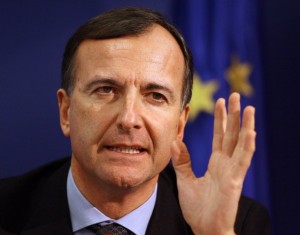In its green paper on Aviation Strategy, published on 7 December, the European Commission points out that the absence of a ‘single european sky’ (a single market for aircraft movements) costs the EU taxpayer some €5 billion a year.
So why is there no Single European Sky? Because the bureaucrats in Brussels and the political leaders in 27 EU member states are not prepared to confront the political heirs of Spanish dictator Franco over an eighteenth century dispute about 800 metres of sand.
The sand in question links Gibraltar to the Spanish mainland. And Spain’s refusal to recognise Gibraltar Airport, built on the isthmus, is blocking not just the Single European Sky but also new rights for air passengers and an aviation agreement with the Ukraine.
Gibraltar belonged to Spain for just two centuries, from 1501 to 1704. Prior to that it belonged to the Arabs, and since 1704 has belonged to the UK. Spain might argue that Gibraltar did not ‘belong’ to the UK until 1713, when they yielded ‘for ever’ to the Crown of Great Britain ‘the full and entire propriety of the town and castle of Gibraltar, together with the port, fortifications and forts thereunto belonging’.
In recent years Spain has claimed that this concession in the Treaty of Utrecht did not include the strip of sand upon which the Allied Forces built an airport in 1942, as a forward base for the war in north Africa; but the land was occupied by Gibraltar in 1704 and has been ever since. Moreover, Spain does not seek the return of any of the other possessions it ceded to other European powers in the Treaty of Utrecht. For reasons of nationalistic political pride, pactus sunt servanda is a principle which Madrid applies differentially.
Hence the EU suffers a fragmented airspace which means delays for passengers, higher carbon emissions, slower economic growth. The latter is particularly true in Gibraltar’s Spanish hinterland, where unemployment is so much higher than average that nearly 10,000 workers cross the border every day to work in Gibraltar. A normally-functioning airport, with a catchment area of over two million inhabitants and some two hours drive from the already overcrowded airport in Malaga, would drive investment and job creation in an area which sorely needs it.
Indeed, when the Socialists ran Spain from 2004 to 2011, they saw such economic opportunity from a normal development of the airport that they agreed with the UK and Gibraltar an airport access-sharing agreement. Each side was to build its half of a new building straddling the frontier fence, with separate exits each side. Gibraltar duly built its side. But when the Partido Popular returned to power in 2011 they repudiated the 2006 Cordoba Agreement. On the Spanish side of the fence there remains a waste-ground.
Moreover, in exchange for the UK’s agreement to pay pensions to retired Spanish workers in Gibraltar, Spain agreed ‘never again’ to seek to exclude Gibraltar airport from application of EU aviation law. While the UK and Gibraltar have thus far stuck to their sides of this bargain in the Cordoba Agreement, Spain has not.
From the EU’s viewpoint, Spain’s sovereignty argument should be bogus. If, as Spain claims, the

land on which the airport is built is Spanish, then EU aviation law should apply to it. If the land is British, such law should apply equally. If the land belongs to the people of Gibraltar, now a self-governing territory but which joined the EU along with the UK in 1973, then EU law should apply. The European Commission, legally bound to act as guardian of the EU’s treaties, prefers to opt for non-application of EU law to Gibraltar airport ‘until the sovereignty dispute between Spain and the UK is settled’, i.e. to wash its hands of the problem rather than risk conflict. So the UK refuses to agree to the Single European Sky legislation. Why do other member states not hold the Commission to account? Why do MEPs allow EU law to be frustrated?
Today, a window of opportunity exists for a breakthrough. Spain’s national election on 20 December will lead to the formation of a new government in Madrid. The Netherlands’ decision to make aviation a priority of their January-June 2016 EU Presidency, including a special ‘aviation summit’, may draw attention to the need to resolve this gridlock. And with President Juncker’s much vaunted economic growth strategy sorely needing a €5 billion boost, perhaps the stars will align to point the way forward. But only if our political leaders have the courage to seize the moment.




![Il bacino del mar Mediterraneo [foto: Wikimedia Commons]](https://www.eunews.it/wp-content/uploads/2025/05/mediterraneo-120x86.jpg)

![caro vita, inflazione, supermercato [foto: imagoeconomica]](https://www.eunews.it/wp-content/uploads/2025/05/Imagoeconomica_1701208-120x86.jpg)
